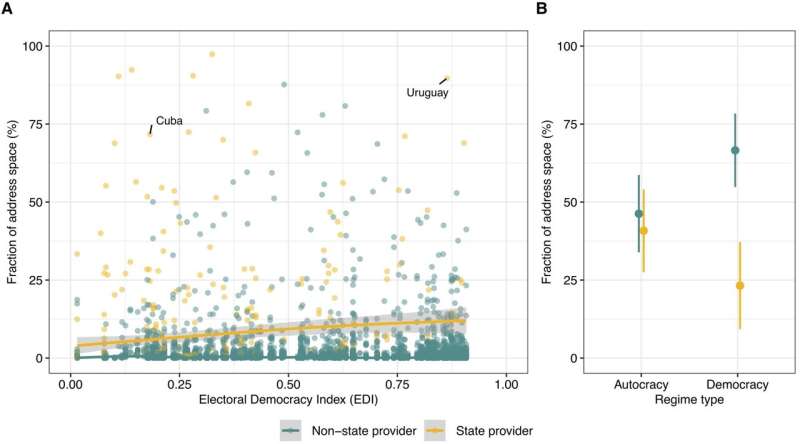This article has been reviewed according to Science X's editorial process and policies. Editors have highlighted the following attributes while ensuring the content's credibility:
fact-checked
trusted source
proofread
Atlas of internet surveillance maps ownership of network infrastructures worldwide

A German-American research team led by the University of Konstanz has mapped the ownership of network infrastructures in democratic and authoritarian states worldwide to show how autocrats control the internet via state-owned service providers.
We often think of state surveillance of the internet in terms of the manipulation or censorship of digital information. Yet, authoritarian states can conduct effective internet surveillance at a much deeper level: by controlling the network infrastructure used to transport data in their country. Owning all the communication routes for the internet is key for controlling a country's digital data traffic. States achieve this by controlling their countries' internet service providers.
In their global study published in PNAS Nexus, a research team from Germany and the U.S. led by the University of Konstanz looked into differences in internet infrastructures in democratic and authoritarian states. The team mapped the global ownership of internet service providers and thus created a kind of "atlas of internet surveillance."
The characteristic pattern: In authoritarian states, more influential internet service providers are predominantly state-owned, whereas in democracies they are largely privatized. Moreover, when autocratic countries have foreign internet service providers, these are usually owned by other authoritarian states.
What ownership of internet service providers reveals about a country
A major contribution of the study is its examination of "transit networks," the networks that forward data traffic onwards. The researchers studied state control of individual points of internet access as well as state influence on transit networks. "Since transit networks are invisible to ordinary users, states can use these networks to surveil and censor content without being held accountable for this action," says Konstanz political scientist Eda Keremoglu.
Indeed, the analysis shows that, in authoritarian states, a significantly higher proportion of data traffic is routed through state-owned transit networks. The opposite is true in democratic countries, where the most influential transit networks are mainly owned by private providers.
Technological cooperation between authoritarian states
Internet service providers often have cross-border operations, or are even active internationally. Thus, it is not unusual for foreign companies to comprise a significant proportion of a country's internet service providers—the companies that connect individual households directly to the internet. This is equally true for democratic and authoritarian states.
However, analysis of these access networks reveals a characteristic difference: "Influential foreign internet service providers operating in autocracies are almost invariably from other authoritarian states. This shows that the international activities of providers follow a political logic," concludes Konstanz political scientist Nils B. Weidmann.
The researchers speak of recognizable clusters of technological cooperation between authoritarian states. This cooperation makes it possible to circumvent more liberal standards on privacy, anonymity and data protection as well as to cement autocratic models while engaging in cross-border cooperation.
Finally, the team of researchers points out that internet surveillance in authoritarian states is probably even more widespread than the study demonstrates. Although state ownership of internet service providers is a direct way to control the flow of data, it is not the only method. States can also put pressure on private internet service providers, which means autocracies also have an indirect option for influencing data traffic.
More information: Eda Keremoğlu et al, Network topology facilitates internet traffic control in autocracies, PNAS Nexus (2024). DOI: 10.1093/pnasnexus/pgae069





















